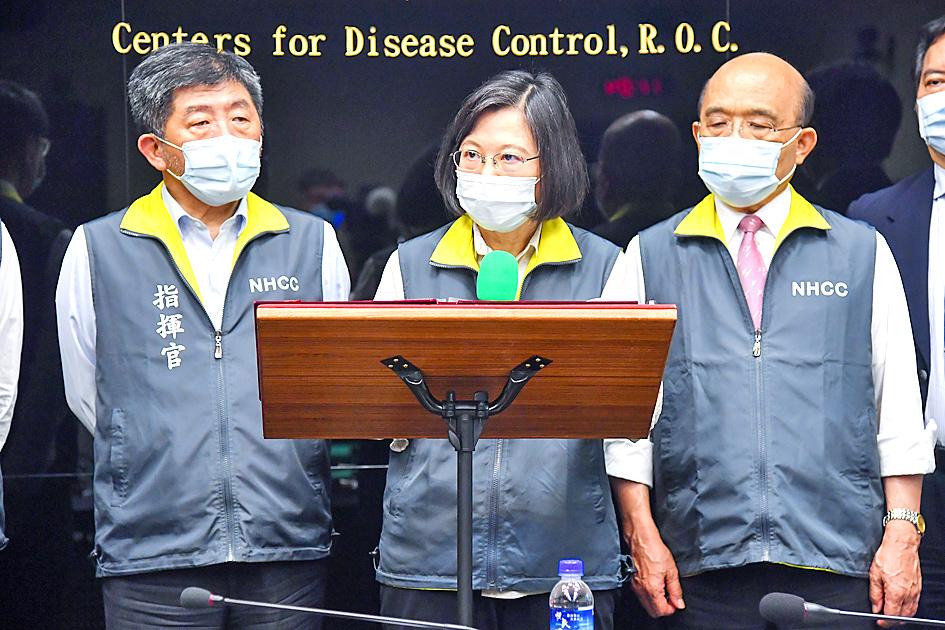President Tsai Ing-wen’s (蔡英文) public approval rating has dropped to a 21-month low following power outages and an increase in locally transmitted COVID-19 infections, a survey showed yesterday.
The Taiwanese Public Opinion Foundation commissioned Focus Survey Research to conduct the survey, which was done by telephone from Monday to Thursday last week.
Tsai’s approval rating dropped to 45.7 percent, the lowest it has been in 21 months, foundation chairman Michael You (游盈隆) said.

Photo: CNA
Premier Su Tseng-chang’s (蘇貞昌) approval rating dropped by 9.5 percent from a survey conducted last month, You said.
“After so many months of favorable governance, the Tsai administration’s ability to run the country is being put to the test,” he said.
The survey asked respondents whether they approved of Tsai’s policies and handling of major issues, to which 8.5 percent said they strongly approved, 37.2 percent approved, 24.9 percent said they did not really approve and 16.4 percent did not approve at all, while 13.1 percent refrained from answering.
The results showed an 8.7 percent decrease in Tsai’s approval rating from a similar poll last month and an 11.4 percent increase in those expressing disapproval of her performance, You said, adding that such a large change in such a short time was rare.
Power outages on May 13 and Monday last week, an increase in local COVID-19 infections and allegations of gang affiliations brought against Democratic Progressive Party members were likely the cause of the approval-rating change, he said, adding that improvements in Taiwan-US relations were insufficient to offset the negative factors.
The survey also asked respondents how satisfied they were with Su’s performance, to which 7.7 percent said they were very satisfied, 37.2 percent were satisfied, 24.7 percent were not really satisfied and 19.9 percent were not satisfied at all, while 10.5 refrained from answering.
“This shows an almost even divide between those satisfied with Su and those not satisfied,” You said. “It’s a complete lack of consensus — and a first for a premier’s approval rating.”
The results showed that 11.5 percent more people expressed disapproval of the premier compared with last month, he said.
The poll collected 1,082 valid samples and has a margin of error of 2.98 percentage points.

The US government has signed defense cooperation agreements with Japan and the Philippines to boost the deterrence capabilities of countries in the first island chain, a report by the National Security Bureau (NSB) showed. The main countries on the first island chain include the two nations and Taiwan. The bureau is to present the report at a meeting of the legislature’s Foreign Affairs and National Defense Committee tomorrow. The US military has deployed Typhon missile systems to Japan’s Yamaguchi Prefecture and Zambales province in the Philippines during their joint military exercises. It has also installed NMESIS anti-ship systems in Japan’s Okinawa

‘WIN-WIN’: The Philippines, and central and eastern European countries are important potential drone cooperation partners, Minister of Foreign Affairs Lin Chia-lung said Minister of Foreign Affairs Lin Chia-lung (林佳龍) in an interview published yesterday confirmed that there are joint ventures between Taiwan and Poland in the drone industry. Lin made the remark in an exclusive interview with the Chinese-language Liberty Times (the Taipei Times’ sister paper). The government-backed Taiwan Excellence Drone International Business Opportunities Alliance and the Polish Chamber of Unmanned Systems on Wednesday last week signed a memorandum of understanding in Poland to develop a “non-China” supply chain for drones and work together on key technologies. Asked if Taiwan prioritized Poland among central and eastern European countries in drone collaboration, Lin

The Chien Feng IV (勁蜂, Mighty Hornet) loitering munition is on track to enter flight tests next month in connection with potential adoption by Taiwanese and US armed forces, a government source said yesterday. The kamikaze drone, which boasts a range of 1,000km, debuted at the Taipei Aerospace and Defense Technology Exhibition in September, the official said on condition of anonymity. The Chungshan Institute of Science and Technology and US-based Kratos Defense jointly developed the platform by leveraging the engine and airframe of the latter’s MQM-178 Firejet target drone, they said. The uncrewed aerial vehicle is designed to utilize an artificial intelligence computer

Renewed border fighting between Thailand and Cambodia showed no signs of abating yesterday, leaving hundreds of thousands of displaced people in both countries living in strained conditions as more flooded into temporary shelters. Reporters on the Thai side of the border heard sounds of outgoing, indirect fire yesterday. About 400,000 people have been evacuated from affected areas in Thailand and about 700 schools closed while fighting was ongoing in four border provinces, said Thai Rear Admiral Surasant Kongsiri, a spokesman for the military. Cambodia evacuated more than 127,000 villagers and closed hundreds of schools, the Thai Ministry of Defense said. Thailand’s military announced that